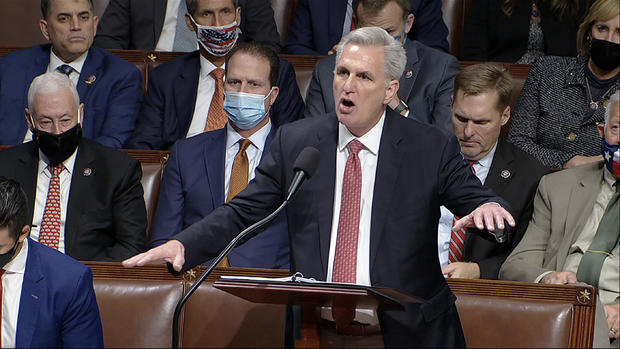The House delayed the vote of President Biden’s signature social spending plan Build Back Better after Minority Leader Kevin McCarthy spoke for several hours, delaying the vote.
McCarthy’s high-energy speech, which lasted over four hours and went well into Friday morning, capped off a busy evening on Capitol Hill after the nonpartisan Congressional Budget Office (CBO) released its cost estimate of the bill. Several moderate Democrats had said they wanted to wait for the score before they voted.
At least two of the moderates who were holding out for the CBO score said on Thursday night that they would vote for it, and another moderate, Congressman Henry Cuellar, who had been on the fence also indicated he would for it. But Democrat’s handle on the bill remained razor-thin, with Representative Jared Golden of Maine still had reservations, and with Democrats’ slim majority, they can only afford to lose three votes. No Republicans are likely to support the bill.
The CBO said Thursday that passage of the legislation would increase the deficit by more than $367 billion over 10 years. But the estimate does not include the revenue that could be generated from increasing IRS enforcement, which the CBO suggested would be $207 billion.
House Television via AP
Treasury Secretary Janet Yellen welcomed the CBO’s analysis: noting that the Treasury Department estimates that the crackdown on tax evaders would raise $400 billion, she said in a statement that the combined CBO scores, Joint Committee on Taxation estimates and her own department’s analysis “make it clear that Build Back Better is fully paid for, and in fact will reduce our nation’s debt over time by generating more than $2 trillion through reforms that ask the wealthiest Americans and large corporations to pay their fair share.”
The CBO has been releasing estimates on individual components of the Build Back Better Act over the past few weeks, but did not address how much money the legislation would raise, or its cost, until Thursday.
Overall, the CBO estimates the legislation would spend $1.63 trillion. The office said changes to the tax code and other provisions would generate more than $1.26 trillion in revenue and suggested increased IRS enforcement would add another $207 billion in revenue.
Some of the CBO figures have come in lower than what the Biden administration estimated. The cost of universal pre-K and affordable child care would cost roughly $382 billion, the agency found, compared to the bill’s line item figure of $400 billion. Prescription drug reforms would save nearly $300 billion — $50 billion more than the White House estimated. Other estimates were closer: both put affordable housing related costs at roughly $150 billion. And the CBO said expanding Medicare to include hearing would cost $36 billion, while the White House said it would be $35 billion.
The CBO also estimated that a four-week paid leave included in the House version of the bill would cost $205 billion. That provision was not included in the revised White House framework because paid leave had been dropped from the bill but was later partially restored by lawmakers.
The White House, which estimated its framework would cost $1.75 trillion, claims it would reduce the deficit over time, generating more than $2.1 trillion over 10 years.
After the House vote on Build Back Better, the bill will head over to the Senate, where the Democrats’ 50-seat majority will surely lead to more changes.
Jack Turman contributed to this report.
